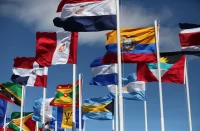ORIENTAL REVIEW: This article was published by Strategic Culture Foundation few hours before the aggression. Latest reports show that the quasi-coalition forces are bombing vital infrastructure objects in Libya: oil reservoirs by Misurata, civilian and military targets in Tripoli, Benghazi, Zuwar. 48 dead, 150+ injured. Gaddafi ceased complying with the resolution 1973 and renewed military operations against separatists. The Libyan depots are opened to supply the people with arms and munitions.
We are sure that within few days you will see how the aggressor is publicly humiliated on his own account…
The recent developments around Libya highlighted the fact that the UN has degenerated into an instrument the US and its allies are using to carve up the world. At least, neither of the UN Security Council’s veto-wielding countries said No to Washington when the dossier of Libya was on the table.
The no-fly zone slapped over Yugoslavia in the late 1990ies simply enabled NATO pilots to bomb the Serbs without taking any personal risks. Having erased the sovereign country from the map of Europe, NATO helped to come into being the disgraceful formation known as the “independent” Kosovo, which at the moment is run by a bandit turned prime minister.Then there were the wars in Asia – in Iraq and then in Afghanistan… At the moment part four of the global drama is unfolding in North Africa.The UN Security Council passed a resolution imposing a no-fly zone over Libya and authorizing the necessary measures supposed to protect the country’s civilians and cities including the rebel center of Benghazi. The resolution was upheld by 10 of the UN Security Council’s permanent members, with five countries – Russia, China, Germany, Brazil, and India – abstaining.
Somehow, only Gadhafi’s forces are confronted with the immediate ceasefire requirement and urged to end all violence, while no likewise demands are addressed to the armed opposition maintaining a stronghold in Benghazi. Even The New York Times openly interpreted calls for taking the necessary measures to protect civilians and to prevent atrocities towards the rebels as a thinly veiled plan for airstrikes against Libya and for the establishment of a no-fly zone which in practice would mean NATO control over Libya’s airspace.
Europe was willing to use force against Libya from the outset and readily started bracing for a military campaign. N. Sarkozy, the number one proponent of the UN Security Council Resolution 1973, said the French forces would be prepared to launch an offensive within several hours. British premier D. Cameron pledged to send Great Britain’s aircrafts to NATO Mediterranean bases – the Rota and Moron airbases generously offered by Spain – before March 18. Even Belgium declared shifting six F-16 fighters to Malta. Norway and, oddly enough, Qatar, Libya’s rival in the global oil business, are going to patrol the Libyan airspace. According to Bloomberg, Qatar’s oil minister Mohammed Saleh Al Sada also promised that his country would supply additional amounts of crude to the world market to offset Libya’s capacities’ being taken off-line.
It factors into the situation that Libyasits on Africa’s largest proven reserves of oil and has been an oil-exporting country for over five decades. Oil revenues account for the lion’s share of the Libyan budget. In January, 2011 Libya’s oil output measured 1,574m bpd, Italy, Germany, Spain, France, China, and the US being the key importers. The list of buyers of Libyan oil also includes Austria, Great Britain, Greece, and Switzerland. The shares of crude import in the total oil consumption in Italy, Germany, and France are 50%, 13%, and 5% respectively. Overall, some 90% of the oil export from Libya land in the EU. Interestingly, while the unrest in Libya seems to put the supply of oil to the global market in jeopardy, the oil prices are nevertheless sliding. A similar trend was reported at the time when Iraq was under attack.
No doubt, the US forces will take the biggest role in Libya. USS Enterprise aircraft carrier and several other US ships are on the way to Libya’s shore. Libya has a minimal defense potential considering that USS Enterprise carries a total of 90 aircrafts and copters and the ships accompanying it are armed with missiles capable of reaching any part of the Libyan territory. Gadhafi’s aircraft park counts 25 MiG-21 fighters, 124 Mig-23, and 40 Su-22 bombers (built back in 1961) plus 2 Su-24MK bombers, and Libya has no modern air defense systems whatsoever.
Germanymust be credited with acting wisely amidst the turmoil. Following the UN Security Council meeting, German foreign minister Guido Westerwelle emphasized Germany’s wish to distance itself from the recently inked resolution. He said Berlin welcomed the tightening of the sanctions but Germany’s involvement in any military campaigns against Libya was out of question. Germany would moreover withdraw its military ships currently patrolling Libya’s territorial waters with the goal of ensuring civilian navigation security.
A spokesman for the Libyan army stated that any foreign intervention would expose the Mediterranean maritime and air routes to serious risks. Libya’s Provisional Defense Committee warned that all military and civilian ships in the region would be regarded by Tripoli as legitimate targets. The statements will not help disguise Libya’s being helpless, but in any case it is not Gadhafi and his regime who stand to lose in the coming fight. Upon devastating Libya and carving it up into pieces roughly proportional to the Western countries’ shares of the Libyan oil output, the West with Obama, Sarkozy, and Cameron at the helm will move on to impose “democracy” on other countries wherever it wishes.
The Guardian wrote not long ago about the US army’s program of propaganda in social media like Twitter, Facebook, etc. Headquartered at the MacDill Airbase in Florida, the program will be operated by 50 servicemen, every one of them running up to 10 pseudo-users registered across the world and engaging in fairly ordinary warfare. In line with the $2.76m contract to develop the program, every operator should be given a convincing legend and protection against the actual identity disclosure. US Central Command spokesman B. Speaks says the US legislation prohibits targeting the country’s own audiences and the information warfare will use languages other than English, for example, Arab, Farsi, Urdu, and Pashtun.
Source: Strategic Culture Foundation














Comments